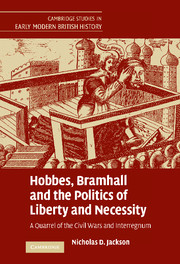 Hobbes, Bramhall and the Politics of Liberty and Necessity
Hobbes, Bramhall and the Politics of Liberty and Necessity Book contents
- Frontmatter
- Contents
- Acknowledgments
- List of abbreviations
- Note on dates and style
- Introduction
- 1 Bishop Bramhall, the ‘Great Arminian’, ‘Irish Canterbury’ and ‘Most Unsound Man in Ireland’, 1633–1641
- 2 Bishop Bramhall, the Earl of Newcastle, Thomas Hobbes and the First English Civil War
- 3 Hobbes's flight to France, De Cive and the beginning of the quarrel with Bramhall, summer 1645
- 4 An epistolary skirmish, 1645–1646: Bramhall's ‘Discourse’, Hobbes's ‘Treatise’ and Bramhall's ‘Vindication’
- 5 Bramhall and the royalist schemes of 1646–1650
- 6 Hobbes and Leviathan among the exiles, 1646–1651
- 7 The public quarrel: Hobbes, Of Liberty and Necessity, 1654, Bramhall, Defence of True Liberty, 1655 and Hobbes, Questions concerning Liberty, Necessity and Chance, 1656
- 8 Castigations of Hobbes's Animadversions and The Catching of Leviathan, 1657–1658: Hobbes as Leviathan of Leviathans
- 9 The Restoration and death of Bramhall and Hobbes's last word, 1668
- Conclusion
- Bibliography
- Index
- Cambridge Studies in Early Modern British History
2 - Bishop Bramhall, the Earl of Newcastle, Thomas Hobbes and the First English Civil War
Published online by Cambridge University Press: 17 July 2009
- Frontmatter
- Contents
- Acknowledgments
- List of abbreviations
- Note on dates and style
- Introduction
- 1 Bishop Bramhall, the ‘Great Arminian’, ‘Irish Canterbury’ and ‘Most Unsound Man in Ireland’, 1633–1641
- 2 Bishop Bramhall, the Earl of Newcastle, Thomas Hobbes and the First English Civil War
- 3 Hobbes's flight to France, De Cive and the beginning of the quarrel with Bramhall, summer 1645
- 4 An epistolary skirmish, 1645–1646: Bramhall's ‘Discourse’, Hobbes's ‘Treatise’ and Bramhall's ‘Vindication’
- 5 Bramhall and the royalist schemes of 1646–1650
- 6 Hobbes and Leviathan among the exiles, 1646–1651
- 7 The public quarrel: Hobbes, Of Liberty and Necessity, 1654, Bramhall, Defence of True Liberty, 1655 and Hobbes, Questions concerning Liberty, Necessity and Chance, 1656
- 8 Castigations of Hobbes's Animadversions and The Catching of Leviathan, 1657–1658: Hobbes as Leviathan of Leviathans
- 9 The Restoration and death of Bramhall and Hobbes's last word, 1668
- Conclusion
- Bibliography
- Index
- Cambridge Studies in Early Modern British History
Summary
At the end of 1641, then, or in the first few months of 1642, Bramhall fled Ireland. Presumably he landed at Chester, the port where most Irish travellers in the seventeenth century entered England. Vesey implies that it was soon after landing in England that the king received him. Vesey was probably following Jeremy Taylor, who related that the fugitive bishop immediately took sanctuary at the king's headquarters at Oxford. But one must suppose that Bramhall was at least briefly in London before repairing to Oxford. For we may assume that it was not long after landing in England that he scribbled his wife the following note from the capital:
I heard great reports to terrify me from coming to London for fear of the Parliament, but find no such thing as yet but many friends in the House. The Earl of Kildare's agents arrested me at Chester and threatened me at London. I have filed a bill against them in Chancery, which I doubt not will end the matter. This has much hindered me from prosecuting the cause for supply to Londonderry.
Bramhall soon removed to his native Yorkshire and by the end of 1642 he was in contact with William Cavendish, first earl of Newcastle, the leading royalist commander in the northern theatre of the First English Civil War, 1642–6. Newcastle had been serving the king in arms on and off since the outbreak of the Bishops' Wars in 1639.
- Type
- Chapter
- Information
- Hobbes, Bramhall and the Politics of Liberty and NecessityA Quarrel of the Civil Wars and Interregnum, pp. 40 - 67Publisher: Cambridge University PressPrint publication year: 2007


